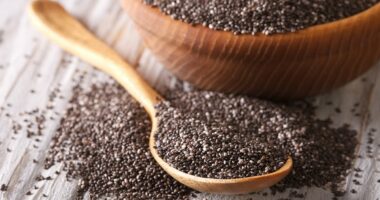Share this @internewscast.com
Chronic constipation can be relieved by eating a daily serving of a 20p fruit, researchers have found.
A new study led by King’s College London found that eating two to three kiwis daily for at least four weeks can alleviate constipation.
Researchers examined three randomized controlled trials involving 192 participants and discovered that the green, hairy fruit ‘significantly enhanced’ bowel movements by 0.36 per week.
These results, which contribute to the first ever evidence-based dietary guidelines for adults experiencing chronic constipation, also recognized rye bread and high mineral-content water as effective natural options for stimulating regular bowel activity.
The recommendations, published in the Journal of Human Nutrition & Dietetics and Neurogastroenterology & Motility, indicate that incorporating psyllium fiber supplements, certain probiotic strains, and magnesium oxide supplements can aid in alleviating constipation.
However, other widely recommended approaches—namely ‘high-fibre diets,’ and senna supplements—were found to lack strong evidence of effectiveness.
The guidelines have gained endorsement from the British Dietetic Association (BDA), which aspires for them to revolutionize the manner in which healthcare professionals manage this prevalent condition in clinical settings.
Furthermore, they can allow people suffering from constipation to better self-manage their symptoms through food and drink choices.

A daily serving of kiwi fruit can help beat constipation, a new study has found
Dr. Eirini Dimidi, a Reader in Nutritional Sciences at King’s College London and the lead author, stated: ‘Chronic constipation can tremendously affect a person’s daily life.
‘For the first time, we’ve provided direction on what dietary approaches could genuinely help, and which diet advice lacks evidence.
‘Addressing this issue through dietary modifications could enable individuals to better manage their symptoms independently and, ideally, enhance their overall quality of life.’
A high-fibre diet has long been heralded as a way to prevent the onset of numerous diseases—as well as keep bowel movements regular.
It has been proven to help lower cholesterol, regulate blood sugars and decrease the risk of developing heart disease, type 2 diabetes and some cancers.
Fibre is vital for the healthy and normal functionality of the digestive system, as it helps digested food move through the intestines and bowel until it is expelled from the colon.
Dr Dimidi added: ‘Eating a high fibre diet offers many benefits to overall health and has been a go-to recommendation for constipation.
‘However, our guidelines found that there simply isn’t enough evidence to suggest it actually works in constipation specifically. Instead, our research reveals some new dietary strategies that could indeed help patients.

Constipation can cause painful bloating (file photo)
‘At the same time, we urgently need more high-quality trials to strengthen the evidence on what works and what doesn’t.’
According to a spokesperson from Kings College, what sets the new guidelines apart from existing recommendations is that they are based on numerous rigorous systematic reviews and meta-analyses.
A multidisciplinary panel of experts, including dietitians, and a nutritionist, gastroenterologist, gut physiologist, and a GP, reviewed over 75 clinical trials to create 59 recommendation statements and identify 12 research priorities.
The recommendations focus on constipation outcomes such as stool frequency, stool consistency, straining and quality of life/.
This makes them more practical for personalised care based on the specific symptoms each individual experiences.
And, to make sure that as many people as possible benefit from them, a clinician-friendly tool has also been developed to support the adoption of these guidelines in everyday practice across the world.
Around one in seven people suffer regularly with constipation, according to a major review of studies in the American Journal of Gastroenterology.
It is defined as passing stool less than three times a week; passing dry and hard stools (which might look like pellets or rabbit droppings); needing to push or strain; and having a swollen or full-feeling gut, even after going to the toilet.
Constipation is twice as common in women than men; this is due to a number of reasons, including women have slightly longer colons (so things simply take longer to move through); fluctuations in sex hormones that can slow the gut down and changes to the pelvic floor following pregnancy.
While constipation is common and often harmless, a persistent change in your usual bowel habits (especially if it comes with blood in your poo, unexplained weight loss, or ongoing tummy pain) can be a sign of something more serious.
















